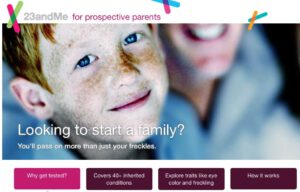My sister learned she was a carrier for a recessive disease, Bloom syndrome, late in one of her pregnancies. I remember the panicked call and the weeks of worry as she and her husband awaited his test results; if he was also a carrier, this meant their daughter had a one in four chance of being born with the disorder.

Thanks to my company, 23andMe, I was able to look at our Family Inheritance feature and see that my sister and I are genetically identical in the region of the BLM gene, making it quite certain that I was also a carrier for Bloom’s, which is an inherited disorder associated with various health problems and an increased risk of cancer.
Several years later, this information was very helpful when I decided to have children. I retested and confirmed with my physician that I am a carrier for Bloom’s.
My husband also got tested and learned that he is not a carrier for Bloom’s, but he is a carrier for Fanconi anemia. Typically in our health care system, I would have to go back and be tested again — another blood draw, a physician visit and weeks of worry. This time, because I had already been genotyped on over one million data points, I already had my data about Fanconi anemia, a genetic disease associated with certain physical abnormalities and increased risk for some kinds of cancer. It turned out I am not a carrier for Fanconi anemia according to 23andMe data, which reports on the three most common mutations. That was reconfirmed by my physician.
23andMe has given back information to customers on carrier status since 2008.
At the end of 2011, we put out our 44th carrier status report. In 2012, we will be publishing many more.
Genetic testing in pregnancy is usually ordered by a physician based on one’s ancestry — Eastern European Jewish (Ashkenazi), Italian, Greek, Middle Eastern, Southern Asian, or African descent. One of the advantages of having a single test that tests for many conditions is that you minimize the guesswork about what you will pass onto your children. We hear over and over again from customers who thought they knew their ancestry but then discovered something new in their DNA.
23andMe believes that by putting this in the hands of consumers, more and more individuals will get tested before getting pregnant. Knowing this information before you are pregnant, we believe, will make you better prepared when you are pregnant.
My sister suffered because she learned something new in the middle of pregnancy and did not expect it. 23andMe wants to encourage getting the information before conceiving so people can go into pregnancy educated and decrease the number of surprises.
Currently insurance companies, by and large, pay for targeted carrier status testing if it can be justified (i.e. if you have the right ancestry that puts you at increased risk for a rare condition) and if you are pregnant.

We believe that this timing is not optimal and the ancestry guesswork is often wrong. By putting the option in consumers’ hands, we believe more and more people will get this information when they are considering having children. By being tested for a large panel of recessive conditions regardless of ancestry, couples will have more comprehensive information and will ultimately be better informed.
Here’s to healthy pregnancies.
www.23andme.com/prospective-parents



